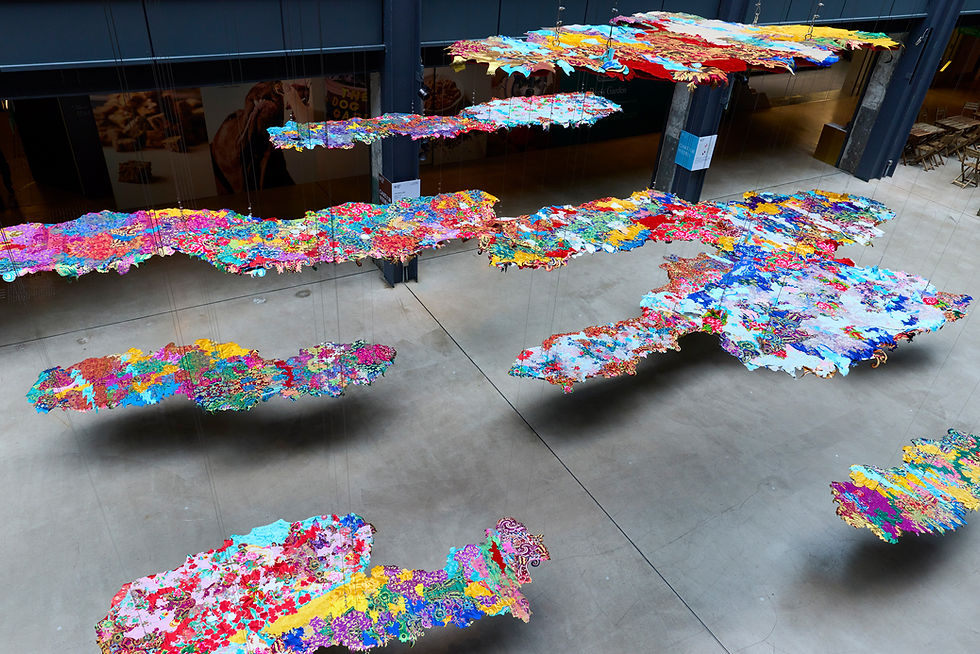A Unified Vision for Sharjah Biennial 16: Insights from co-curators Alia Swastika and Amal Khalaf
- Gen de Art

- Apr 12, 2024
- 2 min read
Updated: Feb 13, 2025
In the heart of Hong Kong Art Week at Art Central, a insighfuldialogue was shared with Alia Swastika and Amal Khalaf, who are among the five distinguished co-curators of the forthcoming Sharjah Biennial 16. Scheduled to welcome visitors in February 2025 in Sharjah, United Arab Emirates, the Sharjah Art Foundation is preparing for an edition that spotlights a broad and decentralized approach to contemporary art.

Image (left to right): Natasha Ginwala, Megan Tamati-Quennell, Zeynep Öz, Alia Swastika and Amal Khalaf. Photo: Danko Stjepanovic
The foundation's selection of Natasha Ginwala, Zeynep Öz, Megan Tamati-Quennell, Swastika, and Khalaf forms a dynamic team of curators poised to offer a rich, multifaceted exploration of contemporary art and cultural practices. Each curator brings a distinct perspective, enriching the Biennial's tradition of fostering artistic experimentation and discourse over its 30-year history.
These curators are crafting projects that engage in dialogue with each other and with the Biennial’s extensive legacy, orchestrating a showcase that spans a variety of artistic backgrounds and disciplines. This effort underlines the foundation's ongoing commitment to involve Sharjah's diverse communities, activating spaces throughout the emirate for the duration of the Biennial.
In an exclusive interview, Swastika and Khalaf unveiled their shared vision for the Biennial, stressing the importance of cultivating dialogue across diverse cultures and disciplines. Their collaborative effort aims to establish a trans-national conversation, particularly bringing Southeast Asian artists into broader engagement with the Middle East, with a special emphasis on collaborative practices.
Both curators expressed a deep commitment to working with artists inclined towards experimental methodologies, as well as those exploring themes of resistance, indigenicity, and women's roles in knowledge creation. Swastika’s approach, informed by her dedication to decoloniality and feminism, leans towards projects that meld contemporary and traditional practices, such as the weaving traditions of Indonesia. Khalaf’s contributions, rooted in the intersection of art and social justice, include an exciting partnership with Filipino artist Stephanie Komenan. This collaboration delves into the lives of seafarers, offering a thematic investigation into maritime histories and migrant labor, themes that resonate deeply with the broader narrative of the Biennial.
“There’s both a responsibility and an exhilaration behind the Biennial,” Khalaf observed, shedding light on the harmonious relationship between the curators and their artistic collaborators. Swastika emphasized the value of integrating diverse cultural practices, focusing on bringing in young, female artists and fostering collaborative projects to invigorate local communities with fresh perspectives. The curators also highlighted the pivotal role of female artists in tackling contemporary challenges, from the pandemic's aftermath to regional upheavals, underscoring the transformative potential of art in these contexts.
Sharjah Biennial 16 is poised to be a vibrant platform for artistic innovation and dialogue, continuing the Sharjah Art Foundation's mission to engage with the community through a spectrum of exhibitions, performances, screenings, and educational initiatives. Under Hoor Al Qasimi’s leadership, the foundation reaffirms its dedication to celebrating the cultural heritage and artistic creativity of Sharjah, ensuring open and free access to a wealth of artistic expressions.
As Sharjah Biennial 16 unfolds, it invites audiences to experience the convergence of diverse artistic visions and ideas, heralding an edition that mirrors the constantly evolving contemporary art landscape.
Sharjah Biennial 16
Photos by Sharjah Biennial 16



